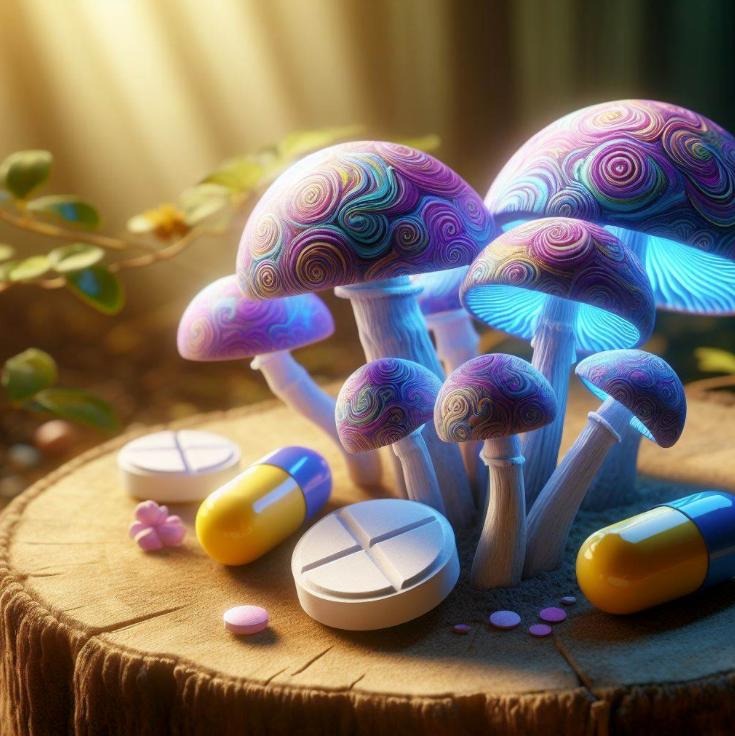Emotions are fundamental to human experience, shaping our perceptions, behaviors, and overall well-being. Within the realm of mental health treatment, understanding how pharmacological agents influence emotional processing is paramount.
In this comprehensive exploration, we delve into the intricate dynamics of emotional regulation under the influence of traditional antidepressants and the psychedelic compound psilocybin.
Traditional Antidepressants: A Foundation of Treatment
Selective serotonin reuptake inhibitors (SSRIs) have long been the cornerstone of pharmacological interventions for mood disorders. By modulating neurotransmitter levels, particularly serotonin, SSRIs aim to alleviate symptoms of depression and anxiety.
However, the efficacy and tolerability of these medications vary widely among individuals, often necessitating a trial-and-error approach in treatment.
Psilocybin: A Novel Frontier in Mental Health
Psilocybin, the psychoactive compound found in certain species of mushrooms, has emerged as a promising avenue for the treatment of depression and other mood-related conditions.
Unlike SSRIs, which require daily administration and may take weeks to exert their full effects, psilocybin acts rapidly and is typically administered in a controlled, single-dose setting under the guidance of trained professionals.
Emotional Reactivity: Contrasting Effects
One crucial aspect of emotional processing is reactivity—the intensity and rapidity of emotional responses to stimuli. Research suggests that while SSRIs may attenuate emotional reactivity over time, potentially blunting negative and positive emotions, psilocybin may heighten emotional reactivity, leading to profound shifts in mood and perception.
These disparate effects underscore the complex interplay between pharmacological agents and emotional regulation.
Empathy and Emotional Connection: Insights from Neuroscience
Empathy, the ability to understand and share the feelings of others, is integral to social interaction and emotional well-being. Neuroimaging studies utilizing techniques such as functional magnetic resonance imaging (fMRI) have revealed distinct neural patterns associated with empathy under the influence of SSRIs and psilocybin.
While SSRIs may modulate neural circuits involved in cognitive empathy, psilocybin appears to enhance emotional empathy and foster a sense of interconnectedness with others and the environment.
Memory Consolidation: The Role of Emotion
Emotional memories are often vivid and enduring, exerting a powerful influence on future behavior and emotional responses. Recent research suggests that both SSRIs and psilocybin may impact emotional memory consolidation, albeit through divergent mechanisms.
While SSRIs may facilitate the extinction of fear-based memories, potentially reducing the emotional impact of traumatic experiences, psilocybin may enhance the salience and emotional valence of memories, leading to profound insights and therapeutic breakthroughs.
Subjective Experiences: Navigating Emotional Landscapes
Beyond neurobiological mechanisms, understanding the subjective experiences of individuals undergoing treatment with SSRIs and psilocybin is crucial.
Qualitative interviews and self-report measures offer valuable insights into the lived experiences of individuals, highlighting the nuanced effects of these substances on mood, emotions, and overall well-being.
These firsthand accounts provide a rich tapestry of emotional transformation and personal growth, illuminating the diverse paths to healing and self-discovery.
Implications for Mental Health Care: Toward Personalized Treatment Approaches
The findings of this research hold significant implications for the field of psychiatry and psychopharmacology. By elucidating the distinct ways in which traditional antidepressants and psilocybin influence emotional processing, this comparative analysis paves the way for more personalized and effective treatments for mood disorders.
Furthermore, it underscores the importance of considering individual differences in treatment response. It highlights the potential of novel therapeutic approaches, such as psychedelic-assisted psychotherapy, in transforming the landscape of mental health care.
Conclusion:
In conclusion, this comprehensive exploration offers a nuanced understanding of how pharmacological agents shape emotional processing in the context of mental health treatment.
By unraveling the complex interplay between traditional antidepressants and psilocybin, we gain valuable insights into the diverse pathways to emotional well-being and healing.
As we continue to navigate the frontiers of psychopharmacology and psychedelic therapy, it is essential to integrate both scientific rigor and humanistic perspectives in our quest to alleviate suffering and promote emotional flourishing.
Month: February 2024
Navigating Emotions: Psilocybin vs Antidepressants for Depression
Emotions are fundamental to human experience, shaping our perceptions, behaviors, and overall well-being. Within the realm of mental health treatment, understanding how pharmacological agents influence emotional processing is paramount. In this comprehensive exploration, we delve into the intricate dynamics of emotional regulation under the influence of traditional antidepressants and the...
Exploring Self-Love Through Psychedelics: A Journey Within
In a world where self-love often takes a backseat to external validation and societal pressures, many individuals find themselves on a quest for genuine self-acceptance and appreciation. This journey can be fraught with challenges and obstacles, but for some, the exploration of psychedelics has offered a unique path to self-discovery...

